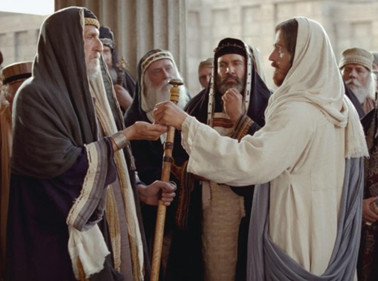It is a sign of spiritual poverty to conceive everything in terms of black and white. It is a sign of spiritual destitution when everything is reduced to right or wrong, true or false, proper or improper. It is a sign that you do not understand and appreciate God's world when you look at a person and declare, without qualification, that he is either good or bad, a sinner or a saint.
 The Pharisees were the good church people of their day, and yet they were spiritually poor. And because they were thus "poor," the Pharisees looked at Jesus and got very confused.
The Pharisees were the good church people of their day, and yet they were spiritually poor. And because they were thus "poor," the Pharisees looked at Jesus and got very confused.
Jesus taught many things about the Kingdom of God that they could agree with, such as how God will judge evil doers and condemn them. Yet Jesus associated with people who were obvious doers of evil: prostitutes, tax collectors, adulterers, and the like. He taught that obedience to God and his law was necessary. Yet he healed people and allowed his disciples to pick grain on the Sabbath. Jesus bothered the Pharisees because while he taught the importance of holiness - a concept that was a part of their faith - he continued to condemn the very people who seemed to them to be the most holy - the teachers of the law, and the hard working priests at the temple.
Jesus disturbed the Pharisees. Having decided that Jesus was a danger to the true faith of Israel, at least to the faith as they defined it, the Pharisees decided to trap Jesus in his own words. They believed that their question - "Is it lawful to pay taxes to Caesar?" - was exceptionally clever. And it was.
But because Jesus did not fit their image of who the Messiah would be, or what a truly Holy person would say and do, they rejected him, and so missed out on the adventure of a lifetime.
They missed, too, the point of Jesus' answer. "What belongs to God," is one's whole self. We cannot be people with divided hearts who spend our time separating our lives into neat, safe little boxes. It is clear from Scripture that we are called to engage the world and bring our beliefs with us into "Caesar's" domain. We are to take our faith into the marketplace and, as Vatican II has reminded us, interpret our times in the light of the Gospel, because God colors the entire mix.
You cannot really know God if you refuse to move beyond what you already know about him. Formulas simply do not work in the Kingdom of God. The formulas, the easy answers, the pat answers - were the very things that blinded the Pharisees to the reality of Jesus.
Jesus calls us to get our priorities straight. He is asking us to speak out and to do something real and concrete about injustice and human dignity. He challenges us to sacrifice our complacency and comfortable-ness for the sake of our fellow pilgrims.
What works in the Kingdom of God - a kingdom that is all around us, a kingdom that includes all earthly kingdoms, and which incorporates all Caesars, all rulers both the good ones and the bad ones - is the sincere desire to do right, the willingness to struggle with issues of conscience, to see God in places that he has never been seen before, and to recognize that God is no longer where he once was.





